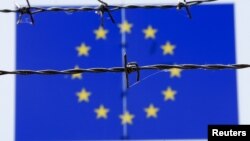Rights groups have sharply criticized as insufficient a deal by European Union leaders to share the burden of harboring roughly 60,000 refugees and asylum seekers. The agreement was reached in Brussels amid deep divisions among the 28-member block.
After rejecting a plan by the European Union’s executive arm to set fixed quotas for taking in the refugees, EU leaders decided instead on a voluntary plan to share the burden of thousands of refugees fleeing poverty and unrest in Africa and the Middle East.
Relocation plan
Over the next two years, 40,000 asylum seekers who crossed the Mediterranean and are now mostly in Italy and Greece will be relocated to other EU states. EU leaders agreed to take in another 20,000 refugees, many of them Iraqis and Syrians now living outside Europe.
The plan is part of a wider EU effort to deal with tens of thousands of migrants heading to Europe, many of them crossing the Mediterranean on rickety boats. EU leaders also agreed to try to weed out economic migrants and try to send them back to their homelands.
EU President Donald Tusk said the deal reached in the early hours Friday was an effort to show "solidarity with frontline countries" - namely Italy and Greece.
But others were less diplomatic. Italian Prime Minister Matteo Renzi said the deal offers only “small help,” while Belgian Prime Minister Charles Michel called it “saddening and disappointing.”
“I am not happy,” said Michel, “because I think that Europe can work better. Immigration is a very important challenge of the future of Europe and ... it was very difficult for a few countries to be solidaire [in solidarity]. And it's a big problem for the future.”
'Not enough'
Rights groups were equally sharp. Daisy Schmitt, who works for the migrants’ rights unit of the International Federation for Human Rights in Paris, said this is “not enough.”
“It might work,” said Schmitt, “but the numbers are too small, given the situation. For example, Lebanon has one million refugees from Syria, so it’s very little.”
Human Rights Watch called it demoralizing to watch EU leaders squabble over what it described as "a few thousand refugees," out of 20 million in the world today.




